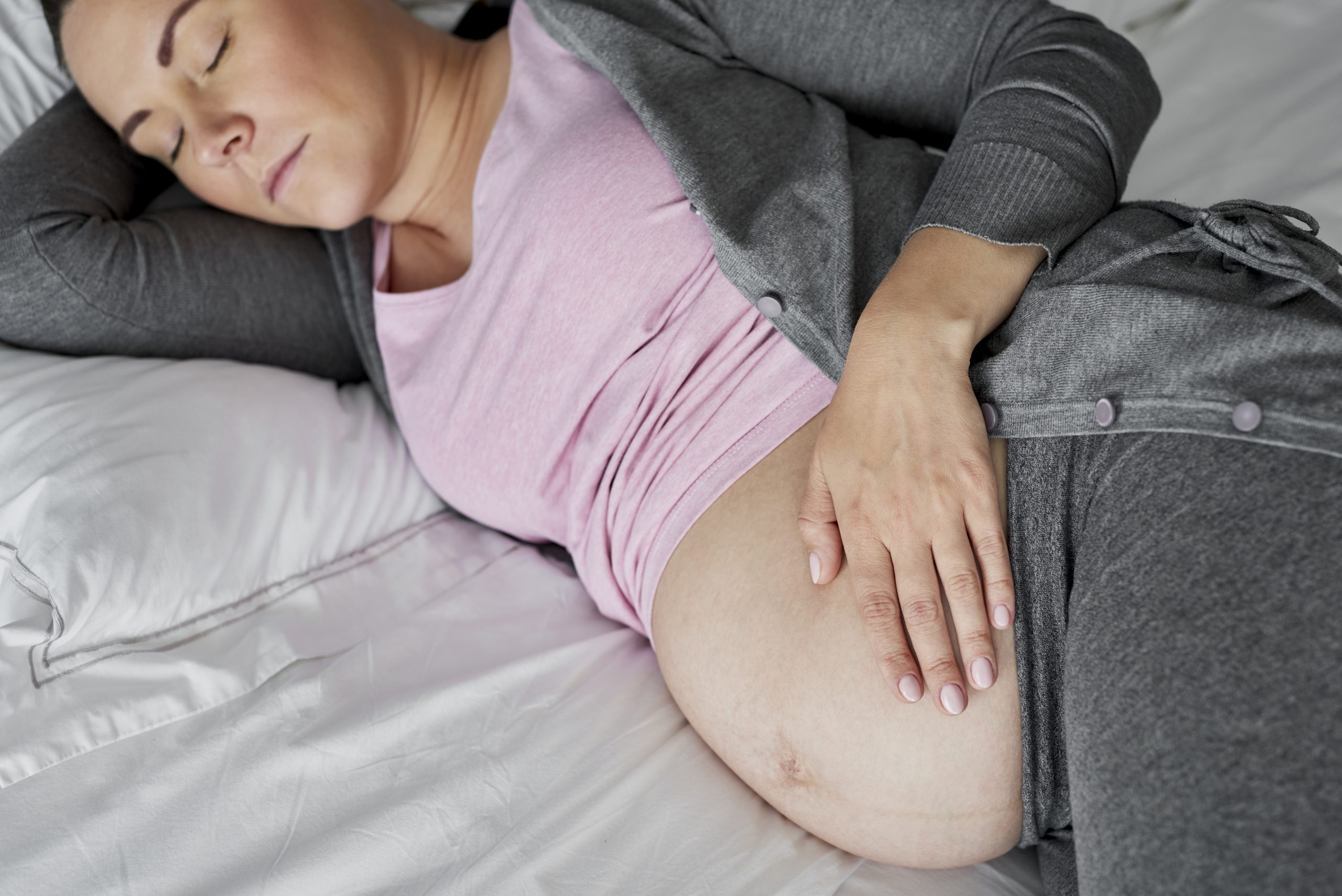Sleeping During Pregnancy

Sleeping Positions, Problems, & Tips
Between midnight bathroom runs, heartburn, a hopped-up metabolism that increases your internal thermostat, a growing baby bump, and all the other difficulties with pregnancy, getting a good night’s sleep can be extremely difficult. However, getting enough sleep is more important than ever now that you’re snoozing for two. Here’s what you’ll need to know about the best sleeping positions, common problems and solutions, and other tips for getting the sleep you need.
Why is sleep so important during pregnancy?
When you’re asleep, your body resets and repairs itself. It’s when your brain makes memories – which can be beneficial when battling against pregnancy brain! Sleep is when your blood vessels restore themselves, which is another beneficial factor when your blood vessels are under increased pressure from extra blood flow required to support your baby. Sleep also keeps your immune system healthy. It controls how your body reacts to insulin. When you don’t get enough sleep, it can result in higher blood sugar levels, increasing your risk of gestational diabetes.
What are the best sleeping positions when you’re pregnant?
When you’re expecting, the best sleeping position is on your left side, although your right side is also perfectly fine. Sleeping on your left is ideal for your circulation, optimizing the oxygen and nutrients that get to your baby. It also helps with kidney function and reducing swelling. Once you’re past your first trimester, sleeping on your stomach becomes impossible, for obvious reasons.
You should also avoid lying flat on your back all night long. The weight of your growing uterus presses on your vena cava – the artery running blood from your lower body to your heart. This can disturb circulation and possibly make your dizzy. Your womb also puts pressure on your intestines and back, making common pregnancy symptoms, like backaches and hemorrhoids, worse.
Common Pregnancy Sleep Problems and Solutions
All the following pregnancy problems can make getting a good night’s sleep difficult. Here are a few sleep problems and solutions for you:
- You don’t like to sleep on your side. Get some full-body and wedge pillows to place between your legs and behind your back. These can be a woman’s best friend. Otherwise, try sleeping in a recliner or another comfortable armchair in a semi-upright position.
- You’re restless. Try working out during the day. Go for a walk, do some yoga, or any other workout that you enjoy. You’re more likely to feel sleepier at night. However, try to avoid exercising within a couple hours of bedtime, as that can make you energized.
- You’ve got a busy mind. Whether you’re stressed about work or the arrival of your new little one, stress can keep you up at night. We suggest talking to a friend, parent, or your partner earlier in the evening. Doing so can help get your worries off your mind before your head hits the pillow.
- Bathroom runs keep you up. If pregnancy has you getting up to go to the bathroom frequently throughout the night, try to limit your fluids after 6 p.m.
- You have restless leg syndrome (RLS). If you feel a creepy-crawly feeling in your legs, you may be among the 15 percent of women who develop RLS in the third trimester. Have a discussion with your practitioner. They may recommend keeping a food journal or they may test you for anemia, which is thought to be linked to RLS.
- You have pregnancy-induced heartburn. Try propping your head up with an extra pillow or two, try to eat at least two hours before bed, and try to avoid spicy, greasy, and citrusy foods.
Tips on getting a good night’s sleep while pregnant.
Here are some tips on falling and staying asleep while pregnant:
- Time your eating. Having a super-full belly can impede on your sleep. However, so can being hungry! We recommend eating a light snack before your head hits the pillow.
- Avoid sugary desserts and caffeine late in the day. Both sugary foods and caffeine can make you jittery, keeping you up at night.
- Start a bedtime routine. Doing some light reading, listening to soothing music, or even taking a bath can help you relax. Getting into a routine with these can send your body signals that it’s time to sleep.
- Avoid electronic devices. Skip using a computer tablet, and even your phone before bed. The light in these gadgets alters sleepiness and alertness. It suppresses the levels of melatonin.
- Get comfortable. In addition to using pillows to surround yourself and prop yourself up, make sure your bedroom is at a comfortable temperature and that it’s dark.
- Try using a sleep app. Explore some of the better-rated sleep apps. Choose from ones that offer meditation or ones that make white or nature sounds.
- Try using meditation. Mediation can use deep breathing exercises that calm down your central nervous system and get your body ready for sleep.
- Use aromatherapy. Aromatherapy may ease pregnancy symptoms. Using lavender can help relax you and bring on sleep faster, so try using a scented pillowcase.
- Don’t stress about losing sleep. Worrying about not sleeping and watching the clock can make you even more stressed, making sleep more elusive. Try doing something to relax if you can’t sleep. Read a book or listen to calming sounds until you feel drowsy.
- Talk to your doctor about sleep aids. There are some sleep aids that are safe for the occasional use during pregnancy. We do not recommend taking any herbal or over-the-counter sleep aids unless you get the green light from your doctor.
If you think that lack of sleep is becoming an issue, talk to your healthcare provider. They can help you find the root of your problem and can help you find a better solution.
